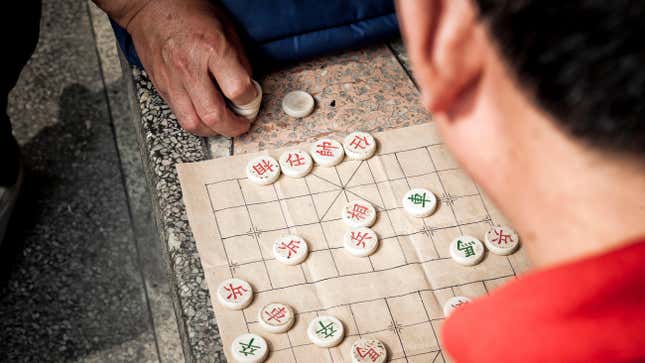
Just when I thought I was out, the anal beads pull me back in. Months after the drama between world chess champion Magnus Carlson and young prodigy Hans Niemann ended with an arbitration agreement, the internet isn’t willing to let go of the idea that board game experts can cheat with the aid of vibrating sex toys cleverly inserted into their rectums. Now the world of Xiangqi, AKA Chinese Chess, is being rocked by a very similar scandal involving even more dirty details from a once-champion who’s being accused of celebrating his victory a little too hard.
Xiangqi might not be as global as chess, but it’s easily one of the most popular board games in China where the goal is to move pieces on the board to capture and eventually checkmate the opponent’s general, or “king.” National reports have swirled around Xiangqi champion Yan Chenglong, the 48-year-old player who won the National Chinese Chess King Competition last week at one of the game’s biggest events held on the Chinese island of Hainan. While Yan defeated dozens of opponents, he celebrated in his hotel by drinking through the night and, according to the Chinese Xiangqi Association, proceeded to get drunk and defecate into the hotel bathtub.
According to a statement from the CXA provided to ABC Australia, Yan’s activities during the night of Dec. 18 “damaged hotel property, violated public order and good morals, had a negative impact on the competition and the event of Xiangqi, and was of extremely bad character.” The association revoked Yan’s title and prize money and banned him from playing for a full year.
But the wild accusations don’t end there. The CXA also addressed a wave of rumors circulating online through the Chinese social media app Weibo. Users were speculating Yan was cheating with the use of anal beads. Some claimed he was clenching and unclenching to communicate with either a computer or person, who would then send back instructions for the best move via vibrations.
The CXA told international media that “Based on our understanding of the situation, it is currently impossible to prove that Yan engaged in cheating via ‘anal beads’ as speculated on social media.”
The talk of anal beads for board game cheating originated during the Niemann-Carlson drama from last year. Magnus, the chess grandmaster and one of the most famous players in the world, accused the then 19-year-old Niemann of cheating in both online and in-person games. While it’s much easier to get computer-assisted moves when you’re safe behind a computer, it’s much harder to cheat in over-the-table chess. That’s not to say there haven’t been some wild cheating allegations in past years, but the anal bead speculation became so memeable, the controversy soon went far beyond the garden walls of the normally insular chess community.
Now the beads are back. How exactly do you prove such a ludicrous claim? You can’t, not really. That Yan was then accused of going too hard in an after-competition celebration, resulting in scat-tastic disaster, isn’t really helping dull the controversy either.